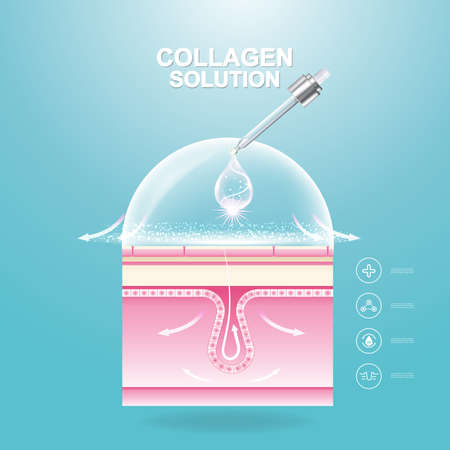1. The Importance of Collagen for Your Skin and Body
Collagen is a protein your body naturally produces, and it plays a major role in keeping your skin, joints, and connective tissues healthy. Think of it as the “glue” that holds everything together—literally! As we age, our collagen production slows down, leading to visible signs like wrinkles, sagging skin, joint discomfort, and even slower recovery after workouts or injuries.
What Does Collagen Do?
Collagen isnt just about beauty—its essential for your overall health. Heres a quick look at how it supports different parts of your body:
| Body Area | How Collagen Helps |
|---|---|
| Skin | Keeps it firm, smooth, and elastic; reduces appearance of fine lines and wrinkles |
| Joints | Cushions joints and helps maintain flexibility and comfort |
| Bones | Supports bone density and strength |
| Hair & Nails | Promotes stronger hair and nails with better growth |
| Gut Health | Supports the lining of the digestive tract for better digestion |
Why Collagen Declines Over Time
Your bodys natural collagen levels begin to drop as early as your mid-20s. Factors like sun exposure, smoking, poor diet, stress, and lack of sleep can speed up this decline. Thats why its important to support your body with natural ways to boost collagen production—something well cover in the next sections.
Signs You May Be Low on Collagen
- Dry or thinning skin
- Aching joints or stiffness
- Brittle nails or thinning hair
- Poor digestion or gut issues
The Takeaway
If youre noticing any of these signs, youre not alone—and theres good news. There are natural ways to help your body produce more collagen, and doing so can improve not only how you look but also how you feel every day.
2. Nutrient-Rich Foods That Boost Collagen Production
Eating the right foods is one of the most natural and effective ways to support your body’s collagen production. Certain vitamins, minerals, and proteins play a big role in how your body creates and maintains healthy collagen levels. Let’s take a closer look at some of the best foods you can include in your daily diet to naturally boost collagen.
Vitamin C-Rich Fruits
Vitamin C is essential for collagen synthesis. It helps link amino acids during the formation of collagen fibers. Without enough vitamin C, your body can’t produce collagen properly. Here are some fruits packed with this powerful nutrient:
| Fruit | Benefits |
|---|---|
| Oranges | High in vitamin C and antioxidants that protect skin cells |
| Strawberries | Rich in vitamin C and ellagic acid which fights skin damage |
| Pineapple | Aids digestion and provides bromelain, an enzyme that reduces inflammation |
| Kiwis | Packed with vitamin C and supports overall skin health |
| Mangoes | Contain vitamin A and C, both key for healthy skin structure |
Collagen-Boosting Proteins
Your body needs amino acids like glycine, proline, and hydroxyproline to build collagen. These are found in protein-rich foods—especially animal-based sources. Try including these options regularly:
| Food Source | Main Benefit |
|---|---|
| Bone Broth | Naturally high in collagen and gelatin; supports joint and skin health |
| Chicken | A good source of connective tissues that provide amino acids for collagen formation |
| Egg Whites | Packed with proline—an important amino acid for collagen production |
| Fish (especially with skin) | The skin contains high levels of collagen peptides that help improve elasticity |
Zinc and Copper-Rich Foods
Zinc and copper are trace minerals that help activate enzymes responsible for collagen production. Add these mineral-rich foods into your meals:
- Nuts & Seeds: Pumpkin seeds, sunflower seeds, and cashews contain both zinc and copper.
- Shellfish: Oysters are especially high in zinc.
- Lentils & Chickpeas: Great plant-based sources of zinc.
A Balanced Diet Makes a Difference
You don’t need fancy supplements to support your skins natural beauty—just real, whole foods! By focusing on fruits rich in vitamin C, quality proteins, and essential minerals like zinc and copper, youre giving your body the tools it needs to maintain strong, youthful-looking skin from the inside out.
![]()
3. Lifestyle Habits That Support Healthy Collagen Levels
When it comes to keeping your skin firm, youthful, and glowing, collagen plays a major role. While skincare products can help from the outside, certain lifestyle habits can naturally support your body’s ability to produce collagen from within. Let’s explore three simple yet powerful habits that can make a big difference.
Stay Hydrated
Water is essential for almost every function in your body, including collagen production. When youre dehydrated, your skin may appear dull, dry, and less plump. Drinking enough water helps maintain skin elasticity and allows cells to function properly.
Tips to Stay Hydrated:
- Aim for at least 8 glasses (64 oz) of water daily
- Add fruits like lemon or cucumber for flavor
- Carry a reusable water bottle with you
Reduce Sugar Intake
Too much sugar in your diet can damage collagen through a process called glycation. This occurs when sugar molecules attach to collagen fibers, making them stiff and brittle. Over time, this leads to wrinkles and sagging skin.
Simple Swaps to Cut Down on Sugar:
| Instead of… | Try This |
|---|---|
| Sugary sodas | Sparkling water with fruit slices |
| Candy bars | Dark chocolate (70%+ cocoa) |
| Baked goods with added sugars | Homemade treats with natural sweeteners like honey or dates |
Avoid Excessive Sun Exposure
The sun’s UV rays are one of the biggest threats to healthy collagen. Overexposure can break down collagen and lead to premature aging, fine lines, and sunspots. Protecting your skin from the sun is key to preserving its structure and firmness.
Sun Protection Tips:
- Wear broad-spectrum sunscreen with SPF 30 or higher every day—even on cloudy days
- Use protective clothing like hats and sunglasses when outdoors
- Seek shade during peak sunlight hours (10 AM–4 PM)
By staying hydrated, cutting back on sugar, and being smart about sun exposure, you’re giving your body the tools it needs to support healthy collagen production naturally—no needles required!
4. Natural Skincare Practices to Preserve Collagen
Keeping your skin healthy and supporting collagen production doesnt always require expensive treatments or harsh chemicals. By using natural skincare ingredients, you can help maintain your skin’s elasticity, firmness, and youthful glow. Let’s explore how antioxidants, hyaluronic acid, and natural oils can play a key role in preserving your skins collagen naturally.
Antioxidants: Protecting Collagen from Damage
Antioxidants are compounds that protect your skin from free radicals—unstable molecules caused by sun exposure, pollution, and stress. Free radicals break down collagen over time, leading to wrinkles and sagging. Incorporating antioxidant-rich products into your skincare routine can help defend against this damage.
Common Natural Antioxidants for Skin
| Antioxidant | Natural Sources | Skin Benefits |
|---|---|---|
| Vitamin C | Citrus fruits, rosehip oil | Boosts collagen synthesis, brightens skin |
| Vitamin E | Almond oil, sunflower oil | Moisturizes and protects skin barrier |
| Green Tea Extract | Green tea leaves | Reduces inflammation and UV damage |
| CoQ10 (Ubiquinone) | Spinach, broccoli, oily fish | Fights oxidative stress, supports cell repair |
Hyaluronic Acid: Nature’s Moisture Magnet
Your body naturally produces hyaluronic acid to keep tissues hydrated and lubricated. In skincare, it acts like a sponge that draws moisture into the skin, helping it stay plump and smooth. Well-hydrated skin creates an ideal environment for collagen maintenance and regeneration.
How to Use Hyaluronic Acid Naturally
- Look for serums with plant-derived hyaluronic acid (often from fermented wheat or vegetables).
- Apply on damp skin to maximize hydration.
- Seal with a moisturizer or natural oil to lock in moisture.
Natural Oils: Nourish and Strengthen Your Skin Barrier
Certain plant-based oils are rich in fatty acids and vitamins that support healthy skin function. They help lock in moisture, reduce inflammation, and create a protective barrier—all of which contribute to healthier collagen levels.
Top Natural Oils for Collagen Support
| Oil Name | Main Nutrients | Benefits for Skin & Collagen |
|---|---|---|
| Rosehip Oil | Vitamin A & C, essential fatty acids | Stimulates collagen production, reduces scars and fine lines |
| Jojoba Oil | B vitamins, Vitamin E, zinc | Mimics skin’s natural oils, strengthens barrier function |
| Argan Oil | Vitamin E, omega-6 fatty acids | Nourishes dry skin, improves elasticity |
| Sea Buckthorn Oil | Omega-7 fatty acids, Vitamin C & E | Promotes tissue repair and regeneration of collagen fibers |
A Simple Natural Skincare Routine for Collagen Health:
- Cleanse: Use a gentle cleanser without harsh sulfates.
- Tone: Apply a toner with green tea or witch hazel.
- Treat: Use a serum with vitamin C or hyaluronic acid.
- Nourish: Apply a natural oil like rosehip or jojoba.
- Sunscreen: Always finish with mineral-based SPF during the day.
Caring for your skin with natural ingredients not only feels good but also helps preserve the building blocks—like collagen—that keep it looking fresh and firm over time.
5. Exercises and Activities That Promote Collagen Production
Keeping your body moving isn’t just good for your heart and muscles — it can also help your skin stay youthful by naturally boosting collagen production. Here are a few types of exercises and activities that can help your body stimulate more collagen in a natural way.
Strength Training
When you lift weights or use resistance bands, youre doing more than toning your muscles. Strength training creates micro-tears in muscle fibers, which signals your body to repair and rebuild — not only muscles but also connective tissues like collagen. This process encourages the production of growth factors that support skin structure and elasticity.
Benefits of Strength Training for Collagen
| Benefit | Description |
|---|---|
| Increased blood flow | Delivers nutrients and oxygen to skin cells, aiding in collagen synthesis |
| Hormonal support | Boosts growth hormone levels that promote tissue regeneration |
| Tissue repair | Stimulates fibroblasts, the cells responsible for collagen production |
Facial Massages
Facial massages aren’t just relaxing — they can also encourage natural collagen production. By gently massaging the face, you increase circulation and lymphatic drainage, helping bring nutrients to the skin and remove toxins. This gentle stimulation wakes up fibroblasts in the skin, encouraging them to produce more collagen over time.
Simple Techniques You Can Try at Home
- Use upward circular motions with your fingertips for 5-10 minutes daily
- Add a facial oil or serum to reduce friction and nourish the skin
- Focus on areas prone to sagging like the cheeks, jawline, and forehead
Low-Impact Exercises
You don’t have to go hard at the gym to see benefits. Low-impact workouts like yoga, Pilates, walking, and swimming can also support healthy collagen levels. These activities improve circulation, reduce inflammation, and regulate cortisol — a stress hormone that can break down collagen when elevated for too long.
Top Low-Impact Exercises for Skin Health
| Exercise Type | How It Helps Collagen Production |
|---|---|
| Yoga | Reduces stress hormones; promotes relaxation and circulation |
| Pilates | Tones deep muscles; supports posture and skin firmness |
| Walking | Aids full-body circulation without joint strain |
| Swimming | Total body workout with minimal impact on joints; improves oxygen delivery to skin cells |
No matter your fitness level, incorporating these activities into your weekly routine can make a visible difference in your skins health over time. The key is consistency and choosing movements that make you feel good both inside and out.

